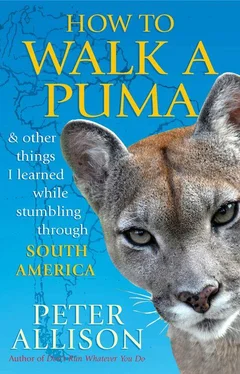‘Don’t do anything I wouldn’t do!’ she’d shouted as she departed from Bogotá airport.
‘I’m going to do heaps of things you wouldn’t!’ I replied, mock perplexed. ‘Like pee standing up!’ The last sight I had of her was her shaking head, and not for the first time I wondered what she saw in me.
•
Oscar, the guide, bore the onerous responsibility of ensuring everyone enjoyed their stay at the beautiful Sacha Lodge, a property on the banks of the Napo River in the Ecuadorian Amazon. This patch of forest—an island of jungle surrounded by oilfields and logging interests—was only maintained thanks to tourist dollars, so keeping people happy was not just Oscar’s job, but a deeply important responsibility.
This was the first time since arriving in South America that I had real work to do, but what lovely work it was! The owners of the lodge had been on safari in Africa and were impressed by African guiding standards. They’d asked me to spend a month at Sacha and let them know what I felt could be done better. I was grateful to be doing them this favour because the property was not only beautiful but fascinating, aswarm with different species of monkey and birds; it also contained two amazing structures that allowed you to climb above the forest canopy and look at animals that rarely or never descended, such as sloths and howler monkeys.
At the same time I felt a bit uncomfortable about my role at Sacha: all the guides I’d been out with were very impressive and professional, but though I’d told them that I’d worked as a guide myself, none of them knew I was there to assess for their boss.
‘I realised today that working with tourists is like working with bees,’ I said later that afternoon to Dan, one of the guides who’d shown me around before I joined Oscar’s group.
‘How so?’ he asked, looking through a book of the region’s snakes to try to identify a species he’d seen earlier.
‘Most days are fine—you enjoy your job, maybe even love it,’ I explained. ‘But then one day you get a prick. And then after more good days you get another prick. And another. You can handle these, but over time the pricks accumulate, until finally your system can’t take it anymore and one day you discover that you’re allergic. And once you’re allergic you can never work with bees again.’
‘Okay,’ said Dan, clearly unimpressed by my analogy.
I wandered off, still pondering my bee-sting epiphany.
The irritating people in his group were not just a problem for Oscar, they were upsetting me too; an idea had been brewing in my mind as I travelled through South America, and now, due to my bee-sting realisation, that idea was deflating at pace, making a raspberry noise as it zipped and withered and flew out the window. I was well aware my travelling days would eventually come to an end, and at some point I’d need to start earning money again. But I simply could not return to Sydney and plug away at a job I cared nothing for with the sole aim of getting ahead in life.
It was clear by now that the TV production company wasn’t going to call back, and guiding was the only job I really felt qualified for. Sharing my passion for animals and the wilderness was perhaps the only work I was ever good at. Before arriving in Sacha I’d thought that maybe, just maybe, I would fall in love with the place, and be invited to come out of my long retirement from guiding and take a job there. However, as Oscar led us on another walk in search of the region’s astonishing diversity of birds I began to fear I had become permanently allergic to tourists. It wasn’t anything to do with Oscar, who was a great guide with sharp eyes and an encyclopaedic knowledge of bird calls. We ticked off species with the sort of names that make non–bird watchers roll their eyes—rufous-capped antthrush, white-browed wood-wren, short-billed foliage-gleaner and the quite lovely blue-crowned motmot. But my enjoyment of the sightings was tempered by my allergy to the woman who kept insisting she couldn’t see, or hear, what we were looking at or for. It had occurred to me at one stage that she might be partially deaf, or blind, and I briefly felt like a thorough bastard for holding her in contempt. But then her husband spoke to her in a low whisper which she obviously understood perfectly, so I went back to being irritated.
Adding to my sense of frustration, I still hadn’t spotted a jaguar; I was told that while they might occasionally pass through Sacha, none of the guides had ever seen one on the property, and the closest I’d come was some big-cat tracks Dan had told me about that tourists had trampled over before I could look at them. But in all honesty it wasn’t the jaguar I was missing, really. It was more that I hadn’t found a life worth living. I’d hoped that South America would inspire me in the same way Africa had, and that I would find a place there that I could settle into for a while before the urge to travel overtook me again. So far, however, there’d always been a reason to move on. And while I’d follow Lisa almost anywhere, I knew that her base of London was somewhere I would stagnate just as fast as Sydney. Homelessness didn’t bother me as a rule, but I wanted at least the option of somewhere I could retreat to happily if need be.
My musings were interrupted by Oscar calling, ‘Look! Leftie the light!’ in his broken English and directing his laser pointer off the trail with great excitement. I spun around in time to see a monkey pop into view. It was cat-sized, and entirely black except for a cute white patch around its mouth and nose from which it took its Spanish name of beber leche (which means ‘drink milk’). More monkeys followed and soon the whole troop was crossing overhead, using branches as trampolines, their athleticism so impressive it almost felt as though they were showing off for our benefit.
‘Wow! Monkeys!’ the woman exclaimed loudly, and stood there slack-jawed, head back, watching their passage. With an uncanny similarity to my experience in the bat cave, the woman’s booming voice gave one monkey a big fright, and its bowels loosened in fear.
If there was a God as vindictive as me the resulting mess might have landed in the woman’s mouth, but instead it only splattered her backpack. And despite the immediate rotten-fruit bouquet emanating from behind her she didn’t notice this either—or my mirth as I covertly chuckled away.
‘Nice shot, monkey,’ I whispered. However juvenile my pleasure, I was suddenly brimming with happiness, and I let go of my earlier worries. This was not Africa, I reminded myself, and to compare it to Africa was as foolish as measuring it against Paris. And to dislike this woman just for her rudeness to guides and general asininity was unfair and reflected far more poorly on me than it did on her. Perhaps I was so disdainful because I was afraid that if I didn’t find a worthy way to spend my life I might become like her. It was time to take all the joy I could from South America, to enjoy it whether or not I wanted to stay there long term, and live and laugh as much as possible in the extraordinary places I was lucky enough to visit.
(And yet, a small voice nagged, it would have been even better if the monkey poo had landed in her mouth, right?)
•
And there was much to like about life as I lazed around in between activities at Sacha Lodge. Every day I was coming across new species of all forms of life, from anteaters to electric eels, and eating bounteously. In fact, my daily walks were proving no match for the amount I was eating, so I decided I should take advantage of the lagoon in front of the lodge and get some exercise more strenuous than mastication.
Shaped like a half-moon, the lagoon stretched perhaps a kilometre either side of the lodge’s deck, its dark waters meeting the shore roughly two hundred metres opposite. A small grassy area on the far bank—cut occasionally by channels that drained the surrounding swamps and gave the lagoon its dark tea colour—gave way to tall trees alive with monkeys and birds.
Читать дальше












